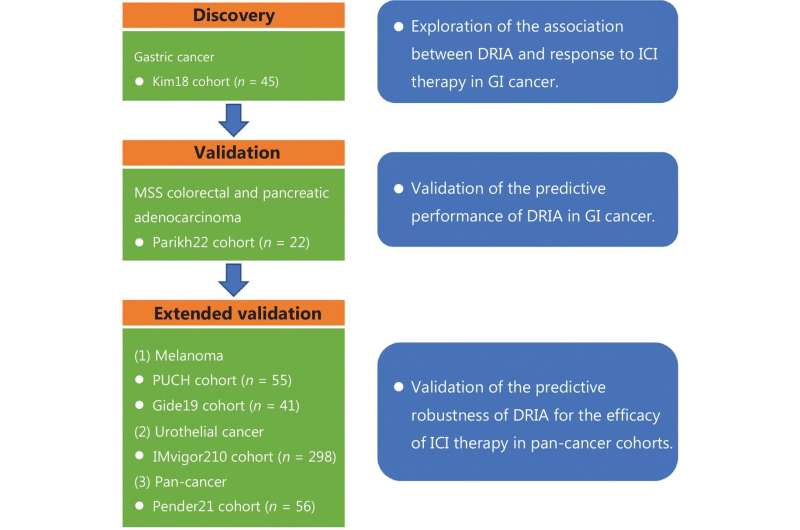This article has been reviewed according to Science X's editorial process and policies. Editors have highlighted the following attributes while ensuring the content's credibility:
fact-checked
proofread
New gene signature could transform immunotherapy for gastrointestinal cancers

Despite significant progress in treating gastrointestinal (GI) cancers through surgical resection, chemotherapy, radiotherapy, and targeted therapy, the objective response rate (ORR) for immune checkpoint inhibitor (ICI) therapy remains low. Common biomarkers such as PD-L1 expression, tumor mutational burden (TMB), and microsatellite instability (MSI) often lack predictive precision or are applicable to only a small subset of patients.
The new DNA damage response-related immune activation (DRIA) signature seeks to overcome these limitations by identifying a unique set of genes associated with DNA damage response (DDR) and immune activation.
A recent study conducted by a team of research from Xijing Hospital of Air Force Military Medical University and Peking University Cancer Hospital, and published in the journal Cancer Biology & Medicine introduces the DRIA signature, a biomarker that predicts patient responses to ICI therapy in GI cancers. This breakthrough could significantly enhance personalized treatment strategies.
The DRIA signature comprises three genes (CXCL10, IDO1, and IFI44L), derived from existing DNA damage immune response assays. Researchers tested its predictive capabilities with clinical and gene expression data from two GI cancer cohorts.
In the discovery cohort, patients with a high DRIA score demonstrated a response rate of 81.8% to ICI therapy, compared to 8.8% among those with a low score. Additionally, the DRIA signature outperformed other predictive markers like PD-L1 expression, TMB, and MSI.
The results suggest that the DRIA signature could become a reliable biomarker for guiding ICI therapy in GI cancers, potentially applicable to other types of cancer as well.
According to Yongzhan Nie, the study's senior researcher, "DDR deficiency has emerged as a key factor in tumor immunogenicity. The DRIA signature offers a new way to predict which patients will respond favorably to ICI therapy, potentially leading to higher survival rates and reduced unnecessary treatments."
With the ability to more accurately predict which patients will benefit from ICI therapy, the DRIA signature could revolutionize the treatment of GI cancers, enabling improved patient stratification, personalized care plans, and better clinical outcomes. Its utility might also extend to other cancer types, opening doors for broader applications in oncology.
More information: Junya Yan et al, DNA damage response-related immune activation signature predicts the response to immune checkpoint inhibitors: from gastrointestinal cancer analysis to pan-cancer validation, Cancer Biology & Medicine (2024). DOI: 10.20892/j.issn.2095-3941.2023.0303

















